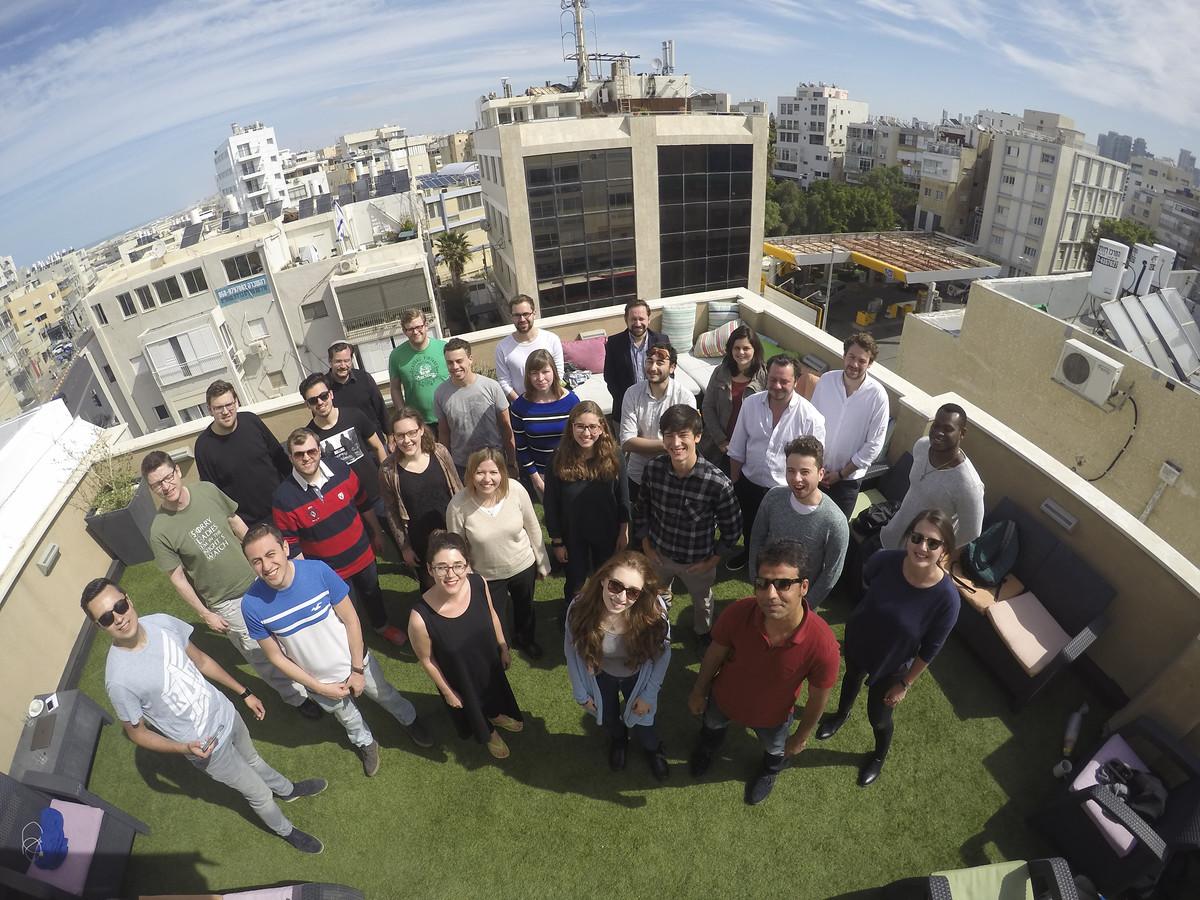Authors: Louisa Riepe, Daliah Marhöfer. Translated By Aaron Schorr.
Experiencing Israel and Jewish culture, discovering similarities and changing perspective – these were the goals that the scholarship recipients of the Konrad Adenauer Institute (KAS) and the Ernst Ludwig Ehrlich Student Foundation (ELES) had in mind during their week in Israel. This educational program, titled “Is Seeing the Same as Understanding? Perspectives on Israel and the Region” brought many to the conclusion that there are no simple solutions for the Middle East.
Over 400 scholars applied for the program, only 20 were selected in the end for the trip – including religious Christians, Jews and Muslims. The group held their first meeting in the German town of Gollwitz, located on the Baltic Sea. The program there began with an introduction to Israeli history and Israel’s relations with Germany and a celebration of the Jewish Sabbath. The journey to Israel continued on Sunday (February 28th). Upon arrival in Jerusalem, the group was received by the Director of the KAS Office in Jerusalem, Dr. Michael Borchard, and was taken on a walking tour of the Old City of Jerusalem. This proved to be an overwhelming experience for the scholars, many of whom were visiting Jerusalem for the first time, as described by KAS scholar Caroline Hütte: “the most moving moment was surely in the Old City, hearing the church bells ringing and the muezzin singing, while seeing the Jewish worshippers, who were dancing. Just all the religions together … It was a special moment, also because you don’t really get that in other places.”
After this introduction, Monday was mainly dominated by politics. Through a visit to the Israeli parliament, the Knesset, and a discussion round with Members of Knesset Yael Cohen Param (Avoda), Nachman Shai (Avoda) and Sharen Haskel (Likud), the participants were presented with various positions in Israeli politics. The group then had a conversation with members of the Manof Forum, an organization for young Likud activists, where they received an impression of how the younger generation in Israel takes part in the political process. In the evening, political blogger Tal Schneider, Dr. Tehilla Shwartz-Altschuler of the Israel Democracy Institute and Dr. Nicola Albrecht, Director of the ZDF Studios in Israel gave the group an insight into the landscape of the Israeli media and into the daily life of journalists in Israel. “I found it pretty interesting to see that as a German reporter in this area, it’s almost impossible to disconnect from the history that you’re constantly confronted with, and so even if you try to do your job as best as you can, you can’t always be a completely objective reporter”, said ELES scholar Igor Mitchnik.
The emotional climax of the trip was a visit to Yad Vashem, the holocaust memorial in Jerusalem. “Yad Vashem really teaches you that the Holocaust can never happen again. This is particularly important today, when we see open racism and burning refugee accommodations in Germany”, said KAS scholar Gerhard Soyka. After a joint reflection conversation, the group met with Arye Sharuz Shalicar, spokesman for the Israeli army (IDF). The son of Iranian refugees who was born in Germany described the way he took to the Israeli Army and outlined the security and political challenges faced by the State of Israel.
Tuesday evening marked the time for the scholars to change their perspective of the Holy Land: Marc Frings, Director of the KAS Office in Ramallah, reported his view of the situation in the Palestinian Territories. A political tour of the Old City of Jerusalem followed the next day. The Society of St. Yves, a Catholic NGO and Office for the Coordination of Humanitarian Affairs of the United Nations informed the group of the legal and humanitarian situation of the Palestinians. This “Perspective Change” ended with a visit to the Dormition Abbey on Mount Zion, where the group spoke with pastor and former KAS scholar Father Nikodemus Schnabel about the challenges that churches in the Holy Land face.
On Thursday, the group traveled to the southern part of Israel, to visit the Shaar HaNegev High School, located directly next to the Gaza Strip. Hesh Rabinovitz, a teacher at the school, explained to the German students what this dangerous location means for his classes and for his students: “When the alarm goes off, we have 15 seconds to run. That’s when the rocket hits.” Therefore, all the classrooms are protected against bombs, but the students can still panic at the slightest sign of an attack. “You don’t worry about yourself, because the school is safe. But what about Mom and Dad at home?” According to Rabinovitz, every other student he teaches suffers from PTSD, caused by the constant threat.
With this impression in mind, the group continued its journey through Israel. In Tel Aviv, they dealt with the topic of the “Start-Up Nation”, discussed the future of German-Israeli relations with German diplomat Monika Iwersen, and discovered how politics and society are presented in the street art of Tel Aviv. The conclusion of the seminar was a joint celebration of Shabbat and a reading by the Israeli author Tal Nitzan.
This cooperation seminar was a big success. The exchange between the students at the different scholarship organizations, who despite the religious differences, got to know each other very personally, was a valuable experience for all the participants. The perspective of the Jewish community in the Diaspora specifically helped open up a very unique view both of Israel and of Jewish life in Germany to the scholars. The seminar thus provided an important contribution towards the promotion of Christian-Jewish dialog among the younger generation in Germany and gave the scholars a deeper understanding of everything related to Israel and the Middle East. The participants returned to Germany with both numerous impressions and answers but also ever more questions.




